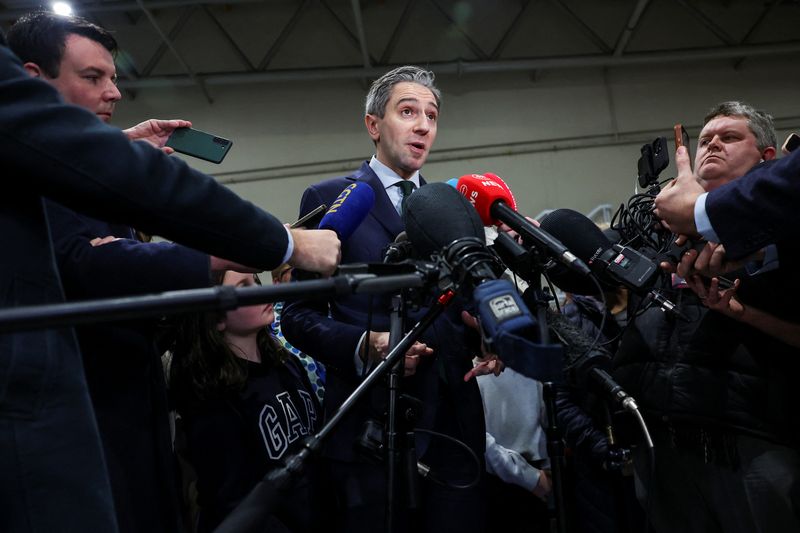DUBLIN (Reuters) -Ireland’s two large centre-right parties looked set to be returned to power after an election on Friday, but will likely need at least one smaller partner to secure a majority, raising questions over the stability of the next government.
That could result in prolonged negotiations or an unstable coalition ahead of the inauguration of U.S. President-elect Donald Trump, whose pledge to slash corporate tax and impose tariffs poses a threat to Ireland’s economy.
Governing parties Fine Gael and Fianna Fail were on 20.5% and 21.9% of first-preference votes respectively, according to a tally by Virgin Media News, with left-wing Sinn Fein on 19.1%.
With the two ruling out a deal with Sinn Fein, the main question was how close to the 88 seats needed for a majority the centre-right parties can get, and whether they would need one or two more coalition parties to get over the line.
“Clearly there is a route there to government,” Fianna Fail’s leader and deputy prime minister, Micheal Martin, told state broadcaster RTE when asked about a deal with Fine Gael and another party. “But a lot will depend … on how many seats the respective parties get.”
Prime Minister Simon Harris said he saw a path to a government, with a possible “leadership role” for his party.
“It’s likely now, I believe, it will be possible to work to form a stable, centrist government,” he told Newstalk Radio.
Fianna Fail could get as many as 48 seats and Fine Gael 39, leaving them on the cusp of 88 seats, former Trinity College Dublin political science professor Michael Gallagher told RTE, citing vote tallies.
The most obvious candidates as coalition partners would be centre-left parties Labour and the Social Democrats, who Gallagher said could take eight seats each.
A clear picture of final seat numbers under Ireland’s complex proportional representation system was not expected until Sunday.
The current junior coalition party, the Greens, were in danger of losing all 12 of their seats, their leader Roderic O’Gorman said.
GIVEAWAY
Harris called the election on the heels of a 10.5 billion euro ($11 billion) giveaway budget that began to put cash into voters’ pockets during the campaign, largesse made possible by billions of euros of multinational corporate tax revenues.
However, a series of missteps, culminating last weekend in a viral clip of Harris walking away from an exasperated care worker, cost his Fine Gael party its pre-election lead.
Sinn Fein, the former political wing of the Irish Republican Army, appeared on course to lead the next government a year ago but suffered a slide in support, in part due to anger among its working-class base at relatively liberal immigration policies.
Fine Gael and Fianna Fail, former rivals that have between them led every government since the foundation of the state almost a century ago, agreed to share the role of prime minister during the last government, switching halfway through the five-year term. A similar arrangement appears likely this time.
In a potential shock, Gerard Hutch, who was named in a court case last year as the head of a family involved in crime, was in fourth place in the Dublin Central constituency and well positioned to take a seat

Hutch said in a recent podcast that he had a number of convictions for robbery as a younger man. He has not been convicted of any other crime more recently and in a rare 2008 interview with RTE, he denied being the leader of a crime gang.
Hutch campaigned on the high level of homelessness and deprivation in his inner city constituency and for tougher policies on migration.
To read the full article, Click Here

